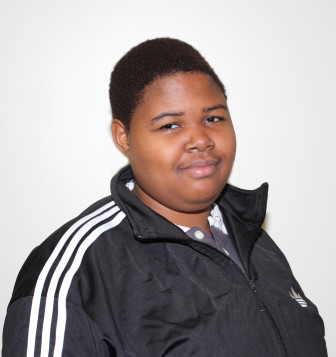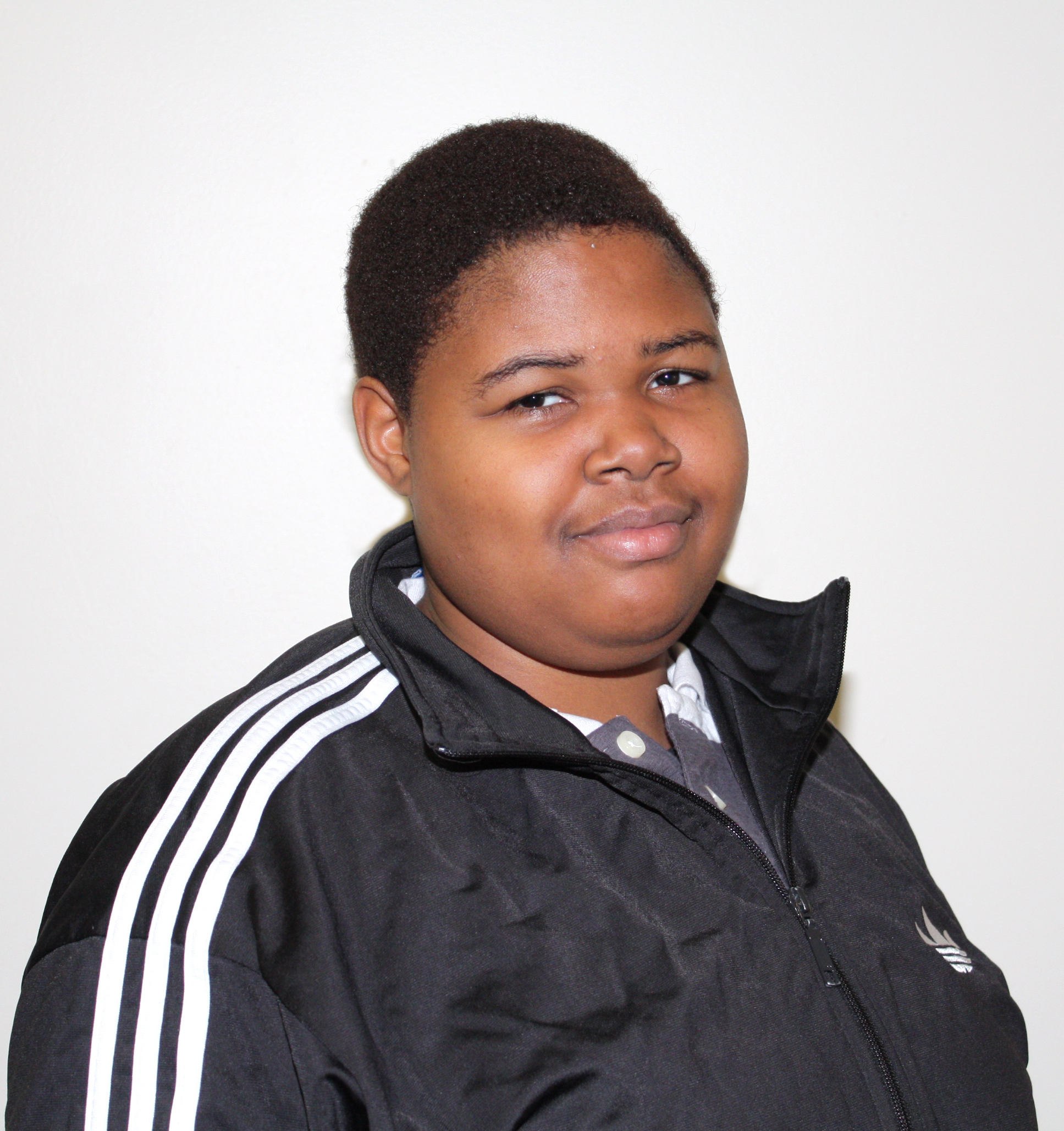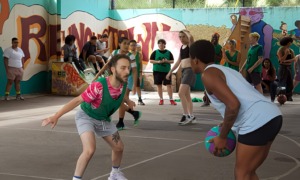 School is important to me. I do not want to go to jail or prison, and I do not want others to make me feel like an idiot. (My adoptive mom called me an idiot.)
School is important to me. I do not want to go to jail or prison, and I do not want others to make me feel like an idiot. (My adoptive mom called me an idiot.)
I learned that school is important the hard way, because when I was in elementary and junior high school, my mind was not focused on school. I was going through a lot of abuse at home, and I thought about killing myself a lot. I was held back and had to repeat a grade twice — in first and ninth grade.
School is also a way to not turn out like my biological family. I love them, but I do not like the things they do — mostly getting high and selling drugs. It makes me sad that their children may grow up the way I did — in foster care. My biological mother was a junkie and an alcoholic, and she signed me into care right after I was born. She passed July 4, 2001.
I loved how they dressed and made her up, and since then I have wanted to study mortuary. Since there are always people dying, I do not have to worry about not having a job. I love helping other people. Morticians help people when they lose their loved ones.
But I need to finish high school to get that career. I started ninth grade at Benjamin Cardozo High School in Queens, NY. I skipped school a lot because I was scared of being bullied. I was wearing dresses and skirts to school even though I felt more like a boy. (My abusive mom would not buy me the clothes I wanted to wear.)
Kids made fun of someone who looked and acted like a boy dressed up as a girl. The bullies tried to get me to react, and when I did get upset and yell at them, we’d both end up in the principal’s office. The worst thing about being bullied was losing control over myself.
I was hospitalized repeatedly for cutting myself, and I wrote suicide notes to my guidance counselor. I came to school crying and with cuts because I was being mistreated at home. My teachers saw that I was emotionally unstable and that I did not belong in a regular school setting. When my teachers and counselors saw my behavioral changes they wondered why was this happening.
I was transferred to Greenburgh Academy high school, for students with behavioral and emotional problems. Everyone there gets an Individualized Education Program (IEP). It was not my first IEP. The first one was in the fifth grade because I did not speak to any of my teachers.
Greenburgh made me feel accepted right from the start. My guidance counselor there, Ms. Peterkins, figured out without my saying anything that I wanted to be called “he” and helped me come up with my masculine name Chris, even though my government name is Tia. The principal, Ms. Howell, spent $100 and some change on boys’ clothes for me. We went shopping together and I felt like me finally. I did not have to hide the fact I was different. Ms. Peterkins is a friend that I could talk to about almost anything.
Ms. Howell and I got close because she understood what I was going through. After I had been at Greenburgh for four or five months she became suspicious about my abusive relationship with my mom. She and Ms. Peterkins saw that I came to school upset and angry. The two of them came together with me in a meeting about what could they do to help me get out of my mother’s house, and that’s when I moved into a group home, where I feel safer.
The staff and students welcomed me, and that made me want to go to school and make something of myself. Greenburgh classes are small — 10 to 15 students. The students get extra help when they need it. My new teachers showed me that I was a bright student and I could do the work. I began working harder. I made sure I handed in all assignments even if they were late; the school is flexible that way. I felt good about the school and myself.
[Related: Getting Myself Back: Living in Foster Care with People Who Let Me Be a Child]
I have learned a lot. I was not the best reader, and I have to admit I still can use some help with my reading. I have to give thanks for my English teachers because they helped me out a lot. One thing they had me do when I didn’t understand something I’d read is to read it out loud. And then I can understand what I’m reading better, enough to look up the words I don’t know.
Greenburgh Academy also helped me with my writing. Ms. Howell told my teachers I was scared to show my talent because other students had laughed when I read something I wrote aloud and pronounced something wrong. I have had great English teachers who help me get my thoughts down on paper. This helped build my confidence by showing people I may be shy but I am not stupid. I like writing debate essays because I like to argue.
Ms. Howell is a very loving and caring person who wants the best for all her students. This year, my senior year, we started a routine where I go to her office first thing and talk about how I want my day to go. It is only me in her office because she does not want my business spreading around the school. She says encouraging things like, “Chris, you are a bright student,” and “Keep up the good work.”
Even though Greenburgh is great, and my self-esteem has risen, some days I want to drop out. On those bad days, I cannot picture myself achieving any of my goals. Instead, I see myself dead or living on the street in a few years. On bad days, it’s hard to see myself in a bright future.
I see a counselor at school, Mr. Gordon. (I still see Ms. Peterkins, but she is not my assigned counselor.) I like him and we talk about my personal issues. Sometimes I get frustrated with myself because I feel and think in a negative manner. And sometimes I get frustrated with others, like when people ask me a question repeatedly. My school helps me by calming me down so my problems do not escalate to anything bigger.
I have been at Greenburgh for 3½ years, and I do not have as many outbursts. If I do, I take a walk or write my feelings. My IEP allows me to leave a class when I feel upset and walk around to calm myself down. Sometimes when I am not in the mood, I do not want to hear noise.
Having people in the school I can go talk to helps me in a couple ways. For one, I am learning self-control by finding alternatives to my outbursts. Also, I can tell my counselors or teachers when another student is saying mean things to me. I am not as scared of bullies as I used to be.
I would still want my birth mom to be proud of me for not following my brothers and my aunt by dropping out of high school and selling drugs. In addition, I would like to be proud of myself for going further than I ever imagined.
My adoptive mother is also proud of me for graduating in 2015 and she wants me to keep up the good work. Greenburgh Academy helps me by letting me be myself and helping me achieve my goal of graduating from high school and going to college and becoming a mortician.
I would recommend Greenburgh to anyone who’s thinking about dropping out of school. They help with emotional problems and educational problems. I used to feel like I was unteachable, but Greenburgh showed me that’s not true.
The writer was 18 when he wrote this story.
This is a teen-written article from our partner, Youth Communication, a New York City-based nonprofit that helps educators engage struggling youth and build their social, emotional and literacy skills. This column was created through Represent, Youth Communication’s magazine written by and for youth in foster care.
Resources for adults working with LGBTQ teens:
GLAAD offers resources for teens and adult allies, including links to hotlines and national organizations such as Trans Student Educational Resources, “a youth-led organization dedicated to transforming the educational environment for trans and gender nonconforming students through advocacy and empowerment.”
Human Rights Campaign offers resources for LGBT youth in foster care.
Advocates for Children of New York offers a guide for LGBTQ teens to understand their rights and specific steps to take if they are harassed at school, become homeless and more. While it refers to New York City, it also has general information useful for all LGBTQ youth.
More related articles:
The American Dream Delayed by Addiction
No Such Thing As a Perfect Family
My Trauma Grew into Motivation to Help Others
































